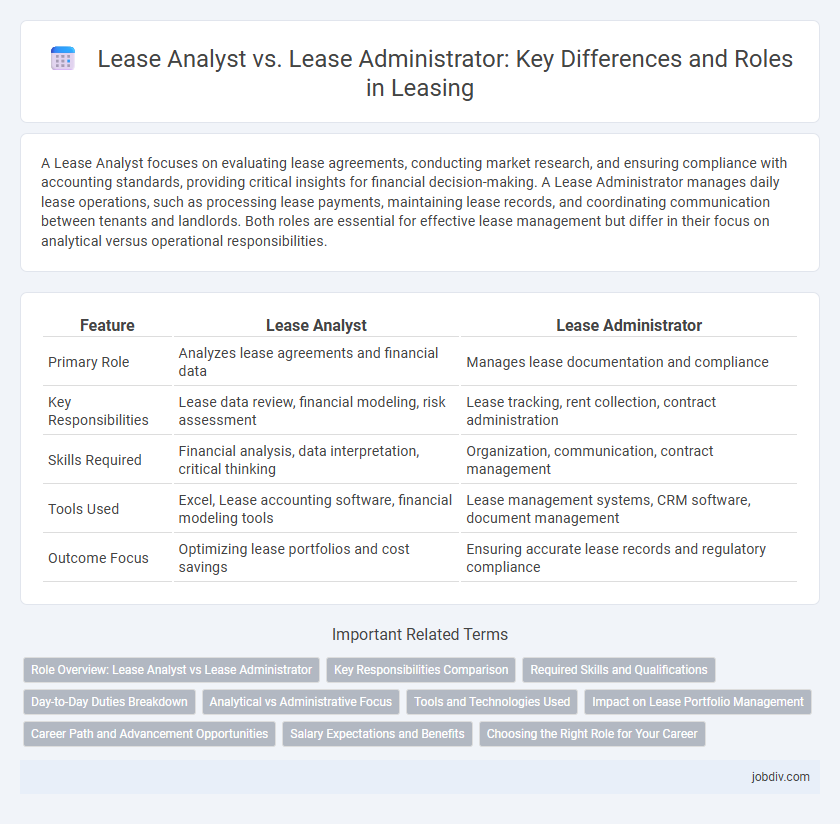A Lease Analyst focuses on evaluating lease agreements, conducting market research, and ensuring compliance with accounting standards, providing critical insights for financial decision-making. A Lease Administrator manages daily lease operations, such as processing lease payments, maintaining lease records, and coordinating communication between tenants and landlords. Both roles are essential for effective lease management but differ in their focus on analytical versus operational responsibilities.
Table of Comparison
| Feature | Lease Analyst | Lease Administrator |
|---|---|---|
| Primary Role | Analyzes lease agreements and financial data | Manages lease documentation and compliance |
| Key Responsibilities | Lease data review, financial modeling, risk assessment | Lease tracking, rent collection, contract administration |
| Skills Required | Financial analysis, data interpretation, critical thinking | Organization, communication, contract management |
| Tools Used | Excel, Lease accounting software, financial modeling tools | Lease management systems, CRM software, document management |
| Outcome Focus | Optimizing lease portfolios and cost savings | Ensuring accurate lease records and regulatory compliance |
Role Overview: Lease Analyst vs Lease Administrator
Lease Analysts specialize in examining lease agreements, conducting financial modeling, and ensuring compliance with accounting standards such as ASC 842 and IFRS 16. Lease Administrators manage lease portfolios by maintaining lease data, coordinating renewals, and overseeing payment schedules to support operational efficiency. Both roles are crucial for accurate lease management but differ in their focus on analytical review versus administrative execution.
Key Responsibilities Comparison
Lease Analysts focus on analyzing lease agreements, conducting financial evaluations, and ensuring compliance with accounting standards such as ASC 842 or IFRS 16. Lease Administrators manage lease documentation, coordinate renewals and terminations, and maintain accurate lease databases to support operational efficiency. Both roles collaborate to optimize lease portfolio management but emphasize distinct aspects of lease lifecycle administration.
Required Skills and Qualifications
Lease Analysts require strong analytical skills, proficiency in financial modeling, and an in-depth understanding of lease accounting standards such as ASC 842 and IFRS 16. Lease Administrators need excellent organizational abilities, expertise in lease documentation management, and familiarity with lease software platforms like Yardi or LeaseQuery. Both roles benefit from knowledge of real estate law, excellent communication skills, and experience with contract negotiation.
Day-to-Day Duties Breakdown
Lease Analysts focus on reviewing and interpreting lease agreements, conducting financial analysis, and ensuring compliance with accounting standards such as ASC 842 and IFRS 16. Lease Administrators handle the day-to-day management of lease documents, tracking payment schedules, coordinating lease renewals, and maintaining communication with landlords and tenants. Both roles require meticulous attention to detail but differ as analysts emphasize data interpretation and reporting, while administrators prioritize operational lease management tasks.
Analytical vs Administrative Focus
Lease Analysts specialize in evaluating lease agreements, performing financial modeling, and conducting market research to optimize leasing strategies and identify cost-saving opportunities. Lease Administrators concentrate on managing lease documentation, ensuring compliance with contractual terms, and coordinating lease renewals and payments to maintain accurate records. The analytical focus of Lease Analysts contrasts with the administrative and operational duties handled by Lease Administrators.
Tools and Technologies Used
Lease Analysts leverage advanced data analytics software and lease accounting tools such as CoStar and Argus to evaluate lease agreements and ensure compliance with financial regulations. Lease Administrators utilize lease management systems like Yardi and MRI to handle lease documentation, payment processing, and tenant communications efficiently. Both roles increasingly depend on cloud-based platforms and automation technologies to streamline lease administration and reporting processes.
Impact on Lease Portfolio Management
A Lease Analyst leverages data-driven insights to evaluate lease terms, identify risks, and optimize financial performance, significantly enhancing strategic decision-making in lease portfolio management. In contrast, a Lease Administrator focuses on accurate record-keeping, compliance monitoring, and contract administration to ensure operational efficiency and reduce lease-related liabilities. Together, these roles drive comprehensive lease portfolio management by balancing analytical evaluation and administrative precision.
Career Path and Advancement Opportunities
Lease Analysts specialize in evaluating lease agreements, financial data, and compliance, making them key in strategic decision-making and often advancing toward roles in financial analysis or real estate portfolio management. Lease Administrators manage lease documentation, coordinate lease processes, and ensure regulatory adherence, which positions them to progress into operations management or senior lease administration roles. Career advancement for both paths depends on developing expertise in lease accounting standards such as ASC 842 and gaining experience with lease management software like Yardi or MRI.
Salary Expectations and Benefits
A Lease Analyst typically commands a higher salary, averaging between $60,000 and $85,000 annually, due to their expertise in analyzing lease agreements and financial impacts. In contrast, Lease Administrators earn around $45,000 to $65,000, focusing primarily on lease documentation and compliance management. Benefits for Lease Analysts often include performance bonuses and professional development opportunities, while Lease Administrators usually receive standard health benefits and paid time off.
Choosing the Right Role for Your Career
Lease Analysts specialize in financial evaluation and lease agreement compliance, using data analytics to optimize lease portfolios and mitigate risks. Lease Administrators focus on managing lease documentation, ensuring timely payments, and maintaining vendor relationships to support operational efficiency. Selecting the right career depends on your strength in analytical financial skills for Lease Analyst roles or detail-oriented administrative abilities for Lease Administrator positions.
Lease Analyst vs Lease Administrator Infographic

 jobdiv.com
jobdiv.com